The Intel SSD 320 Review: 25nm G3 is Finally Here
by Anand Lal Shimpi on March 28, 2011 11:08 AM EST- Posted in
- IT Computing
- Storage
- SSDs
- Intel
- Intel SSD 320
Random Read/Write Speed
The four corners of SSD performance are as follows: random read, random write, sequential read and sequential write speed. Random accesses are generally small in size, while sequential accesses tend to be larger and thus we have the four Iometer tests we use in all of our reviews.
Our first test writes 4KB in a completely random pattern over an 8GB space of the drive to simulate the sort of random access that you'd see on an OS drive (even this is more stressful than a normal desktop user would see). I perform three concurrent IOs and run the test for 3 minutes. The results reported are in average MB/s over the entire time. We use both standard pseudo randomly generated data for each write as well as fully random data to show you both the maximum and minimum performance offered by SandForce based drives in these tests. The average performance of SF drives will likely be somewhere in between the two values for each drive you see in the graphs. For an understanding of why this matters, read our original SandForce article.
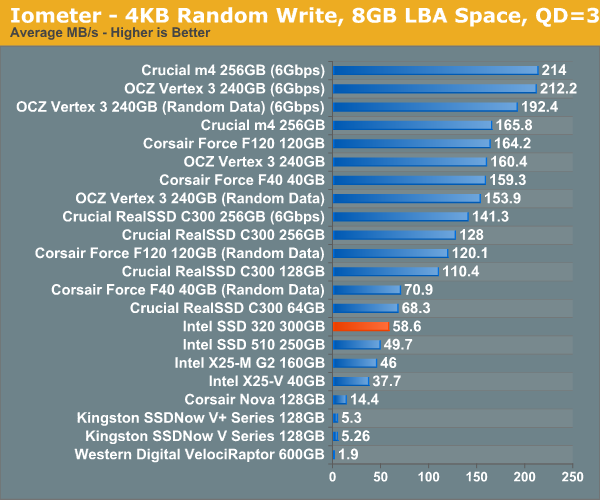
Random write speed is improved compared to the 510 thanks to Intel's controller, but we're only looking at a marginal improvement compared to the original X25-M G2.
Many of you have asked for random write performance at higher queue depths. What I have below is our 4KB random write test performed at a queue depth of 32 instead of 3. While the vast majority of desktop usage models experience queue depths of 0 - 5, higher depths are possible in heavy I/O (and multi-user) workloads:
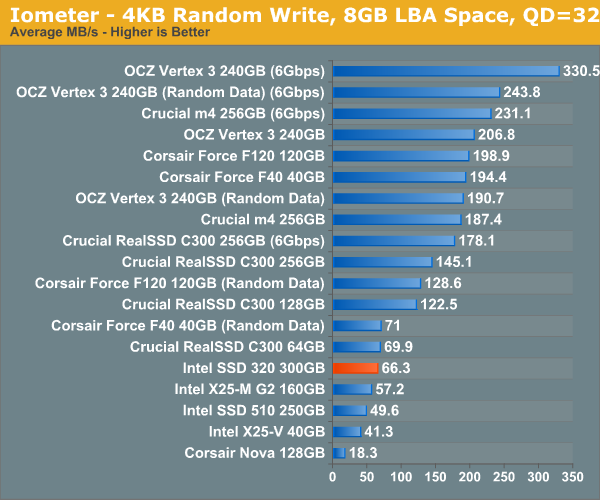
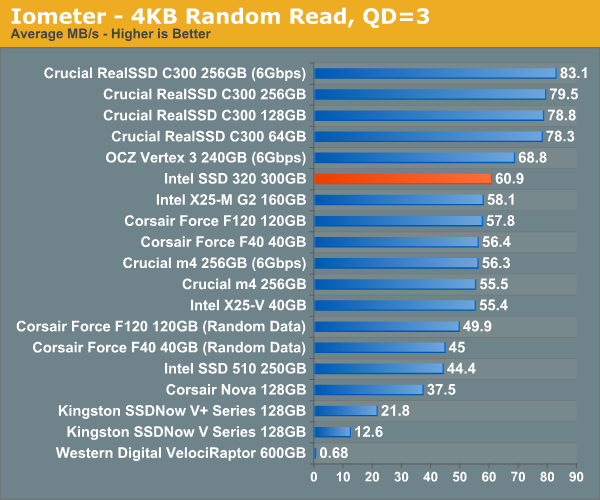
Random read performance has always been a strong point of Intel's controller and the 320 is no different. While we're not quite up to C300 levels, the 320 is definitely competitive here.
Sequential Read/Write Speed
To measure sequential performance I ran a 1 minute long 128KB sequential test over the entire span of the drive at a queue depth of 1. The results reported are in average MB/s over the entire test length.
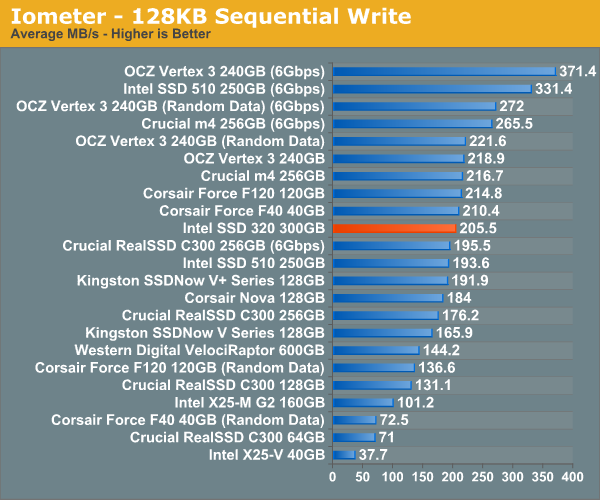
Without a 6Gbps interface the 320's performance is severely limited. Compared to other 3Gbps drives the 320 is quite good here though.
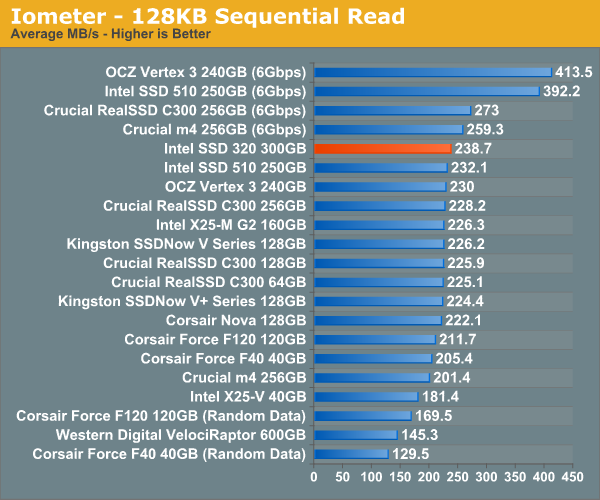
Read performance is at the top of the chart for 3Gbps drives. I wonder how far Intel would've been able to push things if the 320 had a 6Gbps controller.










194 Comments
View All Comments
anthonyjcho - Thursday, November 17, 2011 - link
I just got the 40GB version of this drive for my work computer as a cache drive.I have a large DB files (1-2GB) that I access frequently and I needed a "reliable" SSD for my task. Crucial and Intel came to mind, and only Intel products could be sourced. By the way, I use a OCZ SSD at home for gaming for better read performance.
Long story short,
100-105 MB/s for Read/Write is drastic improvement over the 7200rpm HDD I was using.
My work is much more productive because I don't have to wait so long for data retrieval anymore.
I highly recommend it to any data analyst.
spacehead74 - Thursday, January 5, 2012 - link
I've been finding these on Ebay for less than $200/160gb. The 5-year warranty is a great selling point when using these for laptop upgrades.sqeeek - Thursday, October 2, 2014 - link
Still using two of these as of October 2014. Not the fastest sequential r/w but the random reads + low latency are still mind-blowingly fast compared to a spinning disk. Reliability is great as well - I even bought one used.DocSportello - Monday, September 21, 2015 - link
I installed my 320 in early 2012, and it's still running strong. My first (and thus far only) SSD, so it was a huge step up from HDs.If the numbers I saw at the time were to be believed, 320's were significantly more reliable than the alternatives. I got a bit spooked by those ongoing reports of 8-megabyte crashes; was it just a matter of time until that happened to me? But those reports mostly involved a system crash and usually a power loss; that's rare for me on a desktop with a quality power supply and a UPS.
Anyway, for whatever reason, my 320 is doing well. The specs claimed a million hours MTBF; what did the real numbers turn out to be? Oddly, the SSD Toolbox shows less than a thousand hours of power-on time, which would be unbelievably low, except I saw a post somewhere suggesting that that number is more a count of read/write activity than powered on and ready.
If I were buying today, I'd look at a Samsung 850, figuring the 40 nm cells have got to be inherently more robust than today's typical 19 nm cells. But that's theory; meanwhile the Intel 320 keeps rolling along.